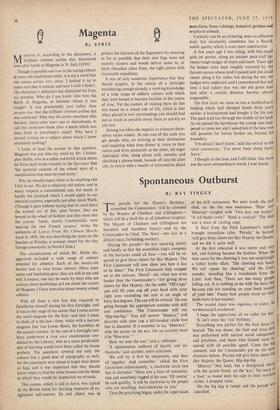Magenta
By STRIX
MAGENTA is, according to the dictionary, a 'brilliant crimson aniline dye, discovered ioon atter battle at Magenta in N. Italy (1859).' Though it possibly survives in the racing colours of some old-established stable, it is not a word that one comes across very often. I looked it up to make sure that it existed, and now I wish I hadn't. The dictionary's definition has distracted me from my purpose. Why do I not know who won the Battle of Magenta, or between whom it was fought? It was presumably post rather than propter hoc that the brilliant crimson aniline dye was confected. Who was the astute merchant who decided, ninety-nine years ago or thereabouts, to call this vivid new shade after a battle which was then fresh in everybody's mind? Why have I started writing on a subject about which I know absolutely nothing?
I know at least the answer to that question. Magenta was put into my mind by Mr. Christo- pher Hollis, who in a rather red-brick article about his Eton days wrote recently in the Spectator that `the sartorial customs of the school were of a complication that went beyond sanity.'
Why he should expect them to be anything else I. fail to see. We are a relatively old nation, and in many respects a conventional one, but sanity is hardly the yardstick which I would apply to our sartorial customs, especially just after Ascot Week. (Though it goes without saying that we must leave the women out of this; poor brutes, they are bound to the wheel of fashion and they must stay the course. 'Some, mostly Continentals, were wearing the new French sacques,' wrote the authoress of Leaves From My Chinese Sketch- book in 1898: she was describing the scene on the beaches at Peitaho, a summer resort for the tiny foreign community in North China.) The complications of which Mr. Hollis dis- approved included a wide range of colours awarded for athletics. Each of the twenty-six houses had its own, house colours. (Ours were cerise and battleship grey; they are still in use and will, I suspect, one day be worn by boys who are as hazy about battleships as I am about the victors of Magenta.) There were also about twenty school colours.
With all these a new boy was required to familiarise himself during his first fortnight, and it was at this stage of my career that I came across the word magenta for the first—and now I come to think of it the last—time; white with a narrow magenta line was Lower Boats, the humblest of the aquatic colours. At the end of a fortnight new boys underwent a viva voce examination con- ducted by the Library, who at a more predictable seat of learning would have been called the house prefects. The questions covered not only the colours but a good deal of topography as well; for the examinees were about to begin their duties as fags, and it was important that they should know where to find the other houses and the shops to which they would be dispatched on errands.
This system, which is still in force, was typical of the British talent for devising measures of en- lightened self-interest. Its real object was to
protect the interests of the fagmasters by ensuring as far as possible that their new fags were not entirely clueless and would deliver notes to, or fetch chocolate cakes from, the right places with reasonable expedition.
It was of only academic importance that they should acquire, in the course of a fortnight bewildering enough already, a working knowledge of a wide range of athletic colours with which they were bound to become familiar in the course of time. Yet the custom of making them do this was based on a sound rule of life, which is that when placed in new surroundings you should find out as much as possible about them as quickly as you can.
Among travellers the impulse to orientate them- selves varies widely. At one end of the scale you get people who, on arriving at their destination and inquiring what time dinner is, retire to their rooms and write postcards; at the other, the eager individual who, slung about with cameras and clutching a phrase-book, bounds off into the alien city, to return with a wealth of information about tram-fares, brass rubbings, botanical gardens and cruelty to animals.
Curiosity can be an irritating, even an offensive trait; but incuriosity sometimes has a flaccid, oafish quality which is even more unattractive.
A few years ago I was riding, with two small girls on ponies, along an ancient pack-trail be- tween rough hedges of thorn and hazel. Years ago the hedges were kept roughly trimmed by the farmers across whose land it passed and you could canter along it for miles; but during the war the hedges were neglected, and I remembered that last time I had ridden that way the old green lane had after a certain distance become almost impassable.
The first farm we came to was a hundred-acre holding which had changed hands three years earlier; a businessman had bought it for his son. The pack-trail ran through the middle of his land. As we passed the farmhouse the young man hap- pened to come out and I asked him if the lane was still passable for horses farther on, beyond his boundary.
`I'm afraid I don't know,' said this recruit to the rural community. 'I've never been along there. Sorry.'
I thought at the time, and I still think, that these are the most extraordinary words I ever heard.


































 Previous page
Previous page